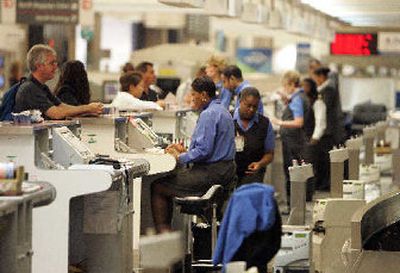Delta, Northwest file for Chapter 11

Delta Air Lines Inc. and Northwest Airlines Corp., hobbled by high fuel costs and heavy debt and pension obligations, filed for bankruptcy protection from creditors Wednesday, becoming the third and fourth major carriers to enter Chapter 11 since the 2001 terrorist attacks.
Delta’s late afternoon filing included its low-fare subsidiary Song and was followed shortly after by Northwest’s.
Delta’s total debt is roughly $28.3 billion, and it listed $21.6 billion in assets, according to the filing. The asset figure would make Delta’s bankruptcy the ninth-largest in U.S. history, according to bankruptcy tracker New Generation Research Inc. The ranking did not change following Delta’s recent $425 million sale of feeder carrier Atlantic Southeast Airlines to SkyWest Inc.
Delta and Northwest said passengers were not expected to see any immediate effects from the filing. Delta also promised to honor all tickets and sent a letter to frequent-flier customers seeking to reassure them. Northwest said it would continue to operate normally its frequent flyer and WorldPerks Visa programs.
“We are operating our full schedule of flights, honoring tickets and reservations as usual, and making normal refunds and exchanges,” Gerald Grinstein, chief executive of Delta, said in the letter.
Chapter 11 protection will allow Delta to pursue cuts in wages for its 65,000-plus full-time employees, as well as pension and health benefits for workers and retirees, that would have been more difficult or impossible without protected status.
Delta was expected to continue its normal schedule. However, as the company makes its way through bankruptcy court, some changes to Delta’s operations could occur, analysts say.
Atlanta-based Delta, the nation’s third-largest carrier, has lost nearly $10 billion over the last four years despite announcing it would cut up to 24,000 jobs. The airline industry was hit hard by the Sept. 11, 2001 attacks, which prompted many people to cut back on air travel.
In September 2004, Delta also said it would shed its Dallas hub as part of a sweeping turnaround plan aimed at saving the airline. It has since scaled back its operations in Dallas.
Northwest, the country’s fourth-largest airline, had been in better financial shape than some of its competitors, with an extensive Asian network and cargo business both thought to be profitable. But that changed after 9-11, the rise in fuel prices and the epidemic of SARS, a virus that spread through several Asian countries, which cut into a core Northwest business.
The recession and slow economic recovery in the early part of the decade also eroded airlines’ business, and the rise of low-cost carriers such as JetBlue Airways Corp. further stymied the big carriers’ rebound.
Delta said it is arranging roughly $2 billion in post-petition financing and already received a commitment for $1.7 billion in financing.
Delta and Eagan, Minn.-based Northwest follow into bankruptcy UAL Corp., the Elk Grove Village, Ill.-based parent of United Airlines, and Arlington, Va.-based US Airways Group, Inc., which is undergoing reorganization for the second time in three years. Fort Worth, Texas-based AMR Corp., the parent of American Airlines, the nation’s biggest carrier, teetered on the verge of bankruptcy before winning deep concessions from its employees.